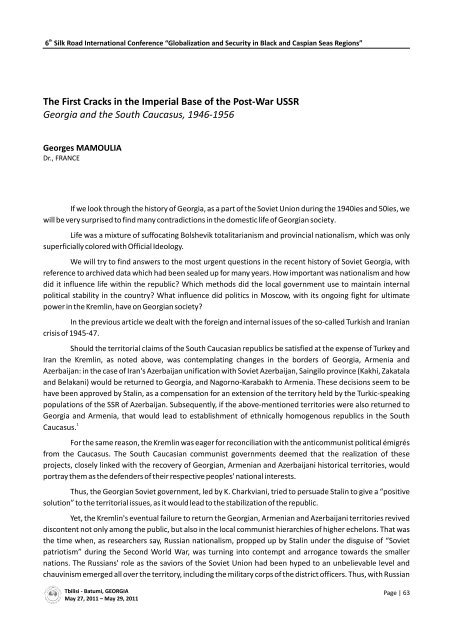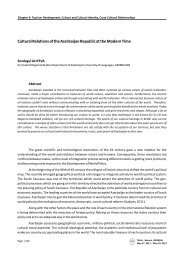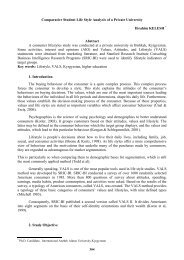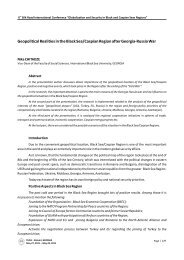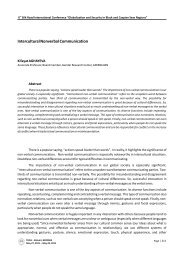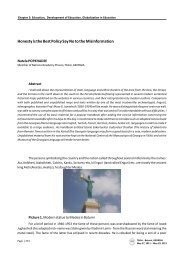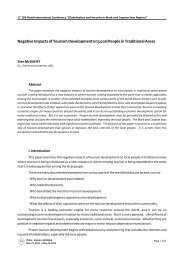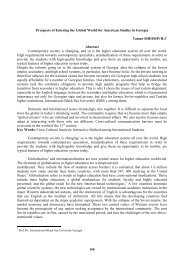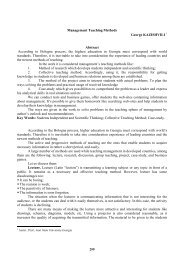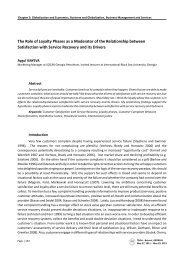Georges MAMOULIA, The First Cracks in the Imperial Base of the ...
Georges MAMOULIA, The First Cracks in the Imperial Base of the ...
Georges MAMOULIA, The First Cracks in the Imperial Base of the ...
Create successful ePaper yourself
Turn your PDF publications into a flip-book with our unique Google optimized e-Paper software.
th<br />
6 Silk Road International Conference “Globalization and Security <strong>in</strong> Black and Caspian Seas Regions”<br />
<strong>The</strong> <strong>First</strong> <strong>Cracks</strong> <strong>in</strong> <strong>the</strong> <strong>Imperial</strong> <strong>Base</strong> <strong>of</strong> <strong>the</strong> Post-War USSR<br />
Georgia and <strong>the</strong> South Caucasus, 1946-1956<br />
<strong>Georges</strong> <strong>MAMOULIA</strong><br />
Dr., FRANCE<br />
If we look through <strong>the</strong> history <strong>of</strong> Georgia, as a part <strong>of</strong> <strong>the</strong> Soviet Union dur<strong>in</strong>g <strong>the</strong> 1940ies and 50ies, we<br />
will be very surprised to f<strong>in</strong>d many contradictions <strong>in</strong> <strong>the</strong> domestic life <strong>of</strong> Georgian society.<br />
Life was a mixture <strong>of</strong> suffocat<strong>in</strong>g Bolshevik totalitarianism and prov<strong>in</strong>cial nationalism, which was only<br />
superficially colored with Official Ideology.<br />
We will try to f<strong>in</strong>d answers to <strong>the</strong> most urgent questions <strong>in</strong> <strong>the</strong> recent history <strong>of</strong> Soviet Georgia, with<br />
reference to archived data which had been sealed up for many years. How important was nationalism and how<br />
did it <strong>in</strong>fluence life with<strong>in</strong> <strong>the</strong> republic Which methods did <strong>the</strong> local government use to ma<strong>in</strong>ta<strong>in</strong> <strong>in</strong>ternal<br />
political stability <strong>in</strong> <strong>the</strong> country What <strong>in</strong>fluence did politics <strong>in</strong> Moscow, with its ongo<strong>in</strong>g fight for ultimate<br />
power <strong>in</strong> <strong>the</strong> Kreml<strong>in</strong>, have on Georgian society<br />
In <strong>the</strong> previous article we dealt with <strong>the</strong> foreign and <strong>in</strong>ternal issues <strong>of</strong> <strong>the</strong> so-called Turkish and Iranian<br />
crisis <strong>of</strong> 1945-47.<br />
Should <strong>the</strong> territorial claims <strong>of</strong> <strong>the</strong> South Caucasian republics be satisfied at <strong>the</strong> expense <strong>of</strong> Turkey and<br />
Iran <strong>the</strong> Kreml<strong>in</strong>, as noted above, was contemplat<strong>in</strong>g changes <strong>in</strong> <strong>the</strong> borders <strong>of</strong> Georgia, Armenia and<br />
Azerbaijan: <strong>in</strong> <strong>the</strong> case <strong>of</strong> Iran's Azerbaijan unification with Soviet Azerbaijan, Sa<strong>in</strong>gilo prov<strong>in</strong>ce (Kakhi, Zakatala<br />
and Belakani) would be returned to Georgia, and Nagorno-Karabakh to Armenia. <strong>The</strong>se decisions seem to be<br />
have been approved by Stal<strong>in</strong>, as a compensation for an extension <strong>of</strong> <strong>the</strong> territory held by <strong>the</strong> Turkic-speak<strong>in</strong>g<br />
populations <strong>of</strong> <strong>the</strong> SSR <strong>of</strong> Azerbaijan. Subsequently, if <strong>the</strong> above-mentioned territories were also returned to<br />
Georgia and Armenia, that would lead to establishment <strong>of</strong> ethnically homogenous republics <strong>in</strong> <strong>the</strong> South<br />
1<br />
Caucasus.<br />
For <strong>the</strong> same reason, <strong>the</strong> Kreml<strong>in</strong> was eager for reconciliation with <strong>the</strong> anticommunist political émigrés<br />
from <strong>the</strong> Caucasus. <strong>The</strong> South Caucasian communist governments deemed that <strong>the</strong> realization <strong>of</strong> <strong>the</strong>se<br />
projects, closely l<strong>in</strong>ked with <strong>the</strong> recovery <strong>of</strong> Georgian, Armenian and Azerbaijani historical territories, would<br />
portray <strong>the</strong>m as <strong>the</strong> defenders <strong>of</strong> <strong>the</strong>ir respective peoples' national <strong>in</strong>terests.<br />
Thus, <strong>the</strong> Georgian Soviet government, led by K. Charkviani, tried to persuade Stal<strong>in</strong> to give a “positive<br />
solution” to <strong>the</strong> territorial issues, as it would lead to <strong>the</strong> stabilization <strong>of</strong> <strong>the</strong> republic.<br />
Yet, <strong>the</strong> Kreml<strong>in</strong>'s eventual failure to return <strong>the</strong> Georgian, Armenian and Azerbaijani territories revived<br />
discontent not only among <strong>the</strong> public, but also <strong>in</strong> <strong>the</strong> local communist hierarchies <strong>of</strong> higher echelons. That was<br />
<strong>the</strong> time when, as researchers say, Russian nationalism, propped up by Stal<strong>in</strong> under <strong>the</strong> disguise <strong>of</strong> “Soviet<br />
patriotism” dur<strong>in</strong>g <strong>the</strong> Second World War, was turn<strong>in</strong>g <strong>in</strong>to contempt and arrogance towards <strong>the</strong> smaller<br />
nations. <strong>The</strong> Russians' role as <strong>the</strong> saviors <strong>of</strong> <strong>the</strong> Soviet Union had been hyped to an unbelievable level and<br />
chauv<strong>in</strong>ism emerged all over <strong>the</strong> territory, <strong>in</strong>clud<strong>in</strong>g <strong>the</strong> military corps <strong>of</strong> <strong>the</strong> district <strong>of</strong>ficers. Thus, with Russian<br />
Tbilisi - Batumi, GEORGIA<br />
May 27, 2011 – May 29, 2011<br />
Page | 63
Chapter 2: Security and Stability Policies, Anti-Terrorism Policy, Conflict Resolution Policy<br />
chauv<strong>in</strong>ism collid<strong>in</strong>g with Caucasian nationalism a conflict between <strong>the</strong> rul<strong>in</strong>g center <strong>of</strong> <strong>the</strong> Red empire and <strong>the</strong><br />
South Caucasian republics was becom<strong>in</strong>g ever more likely.<br />
<strong>The</strong> confrontation came to a head <strong>in</strong> <strong>the</strong> spr<strong>in</strong>g <strong>of</strong> 1947 as a result <strong>of</strong> power changes <strong>in</strong> Kreml<strong>in</strong>,<br />
result<strong>in</strong>g <strong>in</strong> a weaken<strong>in</strong>g <strong>of</strong> L. Beria's position.<br />
In 1938, after leav<strong>in</strong>g Tbilisi for Moscow, Beria had managed to ma<strong>in</strong>ta<strong>in</strong> his personal control over<br />
Georgia. Like Stal<strong>in</strong> he was a member <strong>of</strong> <strong>the</strong> Central Comittee <strong>of</strong> <strong>the</strong> republic's Communist Party and could<br />
2<br />
personally determ<strong>in</strong>e key issues <strong>in</strong> matters <strong>of</strong> recruitment.<br />
In his memoirs N. Khrushchev noted that:<br />
“<strong>The</strong> affairs <strong>of</strong> Georgia were run by Beria, who had previously held <strong>the</strong> position <strong>of</strong> Secretary <strong>of</strong><br />
Georgia's Communist Party's Central Committee. He supported it and allowed no one to <strong>in</strong>terfere <strong>in</strong> Georgian<br />
3<br />
affairs. Moreover, Beria was <strong>the</strong> only person to <strong>in</strong>form Stal<strong>in</strong> about Georgia”.<br />
A. Mgeladze, <strong>the</strong> former <strong>First</strong> Secretary <strong>of</strong> Georgian Communist Party, who was later to become an<br />
active opponent <strong>of</strong> Beria, noted that until 1951 <strong>the</strong> Georgian government had referred to Beria for all <strong>the</strong><br />
4<br />
important issues and only after that went to Stal<strong>in</strong>.<br />
In 1946 V. Merkulov, a protégé <strong>of</strong> Beria, was replaced as M<strong>in</strong>ister <strong>of</strong> State Security <strong>of</strong> <strong>the</strong> USSR by V.<br />
Abakumov, <strong>the</strong> former head <strong>of</strong> “SmerSh” – <strong>the</strong> Ma<strong>in</strong> Department <strong>of</strong> military counter-<strong>in</strong>telligence. At <strong>the</strong> same<br />
time Beria had been stripped <strong>of</strong> his power to control recruitment <strong>in</strong> <strong>the</strong> M<strong>in</strong>istry <strong>of</strong> State Security <strong>of</strong> <strong>the</strong> USSR.<br />
5<br />
From 1947 on, that power would be entrusted to A. Kuznetsov , <strong>the</strong> Secretary <strong>of</strong> <strong>the</strong> Central Committee <strong>of</strong> <strong>the</strong><br />
Communist Party, <strong>the</strong> leader <strong>of</strong> <strong>the</strong> so-called “Len<strong>in</strong>grad team” and an enthusiastic Great-Russian chauv<strong>in</strong>ist.<br />
Soon, on Stal<strong>in</strong>'s <strong>in</strong>structions, Beria's men <strong>in</strong> Georgia would experience fur<strong>the</strong>r impact. In January<br />
1948 Abakumov replaced A. Rapava, one <strong>of</strong> Beria's closest associates, by N. Rukhadze as Georgian M<strong>in</strong>ister <strong>of</strong><br />
State Security; <strong>the</strong> new M<strong>in</strong>ister's first steps were to purge <strong>the</strong> m<strong>in</strong>istry <strong>of</strong> personnel loyal to Rapava.<br />
In May <strong>of</strong> <strong>the</strong> same year, ano<strong>the</strong>r <strong>of</strong> Beria's associates, P. Sharia, was dismissed from his position as<br />
Propaganda Secretary <strong>of</strong> <strong>the</strong> Georgian Communist Party. Sharia had been sent to France <strong>in</strong> 1945, to establish<br />
6<br />
contacts with <strong>the</strong> Georgian émigrés <strong>the</strong>re.<br />
Not surpris<strong>in</strong>gly, as <strong>the</strong> Georgian communist's <strong>in</strong>fluence was fad<strong>in</strong>g <strong>in</strong> <strong>the</strong> Kreml<strong>in</strong>, <strong>the</strong> supporters <strong>of</strong><br />
Great-Russian chauv<strong>in</strong>ism <strong>in</strong> Caucasia – namely <strong>the</strong> high command <strong>of</strong> <strong>the</strong> Transcaucasia military district, tried<br />
to take advantage <strong>of</strong> <strong>the</strong> situation.<br />
In 1942 Stal<strong>in</strong> had ordered 10 national divisions to be recruited from <strong>the</strong> populations <strong>of</strong> <strong>the</strong> South<br />
Caucasian republics. Parts <strong>of</strong> those divisions had taken part <strong>in</strong> <strong>the</strong> hostilities and by <strong>the</strong> end <strong>of</strong> <strong>the</strong> war three<br />
divisions only had been left <strong>in</strong> <strong>the</strong> Transcaucasia military district, namely <strong>the</strong> 414th Georgian, <strong>the</strong> 86th<br />
Armenian and <strong>the</strong> 216th Azerbaijan divisions.<br />
Effective command <strong>of</strong> <strong>the</strong> troops <strong>in</strong> <strong>the</strong> South Caucasia had s<strong>in</strong>ce 1947 been <strong>in</strong> <strong>the</strong> hands <strong>of</strong> two deputy<br />
commanders <strong>of</strong> <strong>the</strong> Transcaucasia military district: Colonel-general M. Kazakov, as Chief <strong>of</strong> Staff <strong>of</strong> <strong>the</strong> district,<br />
and major-general D. Kolesnikov as deputy commander <strong>of</strong> <strong>the</strong> district for political matters.<br />
Marshal F. Tolbukh<strong>in</strong>, <strong>the</strong> commander <strong>of</strong> <strong>the</strong> Transcaucasia district, who had good relations not only<br />
with Beria but also with <strong>the</strong> Georgian communist leaders, had left his post due to health reasons and, unlike<br />
him, his successor general Antonov did not have enough power or simply did not want to oppose <strong>the</strong> <strong>in</strong>creas<strong>in</strong>g<br />
tendency towards Russian chauv<strong>in</strong>ism.<br />
On November 10 1947, lieutenant-general N. Rukhadze, head <strong>of</strong> <strong>the</strong> department <strong>of</strong> counter<br />
<strong>in</strong>telligence at <strong>the</strong> M<strong>in</strong>istry <strong>of</strong> <strong>the</strong> State Security <strong>of</strong> <strong>the</strong> Transcaucasia military District, <strong>in</strong>formed <strong>the</strong> commander<br />
<strong>of</strong> <strong>the</strong> armies <strong>of</strong> <strong>the</strong> district, as well as <strong>the</strong> communist leaders <strong>of</strong> <strong>the</strong> region, that<br />
Page | 64<br />
Tbilisi - Batumi, GEORGIA<br />
May 27, 2011 – May 29, 2011
th<br />
6 Silk Road International Conference “Globalization and Security <strong>in</strong> Black and Caspian Seas Regions”<br />
7<br />
“<strong>in</strong>cidents <strong>of</strong> Great Russian chauv<strong>in</strong>ism <strong>in</strong> <strong>the</strong> military units <strong>of</strong> <strong>the</strong> district have been on <strong>the</strong> rise”.<br />
Rukhadze stressed that, <strong>in</strong> all <strong>the</strong> units <strong>of</strong> <strong>the</strong> district, counter <strong>in</strong>telligence had observed many<br />
<strong>in</strong>stances <strong>of</strong> Great Russian bigotry.<br />
“Meanwhile <strong>the</strong> commanders <strong>of</strong> <strong>the</strong> units, high-rank<strong>in</strong>g <strong>of</strong>ficers and generals did not wish to curb<br />
8<br />
chauv<strong>in</strong>istic behavior <strong>in</strong> <strong>the</strong> military forces, moreover <strong>the</strong>y have <strong>the</strong>mselves encouraged soldiers towards it”.<br />
In his letter, Rukhadze gave several sample quotations from <strong>the</strong> heads <strong>of</strong> regiments, brigades, divisions,<br />
corps and armies, all <strong>of</strong> <strong>the</strong>m hateful towards <strong>the</strong> Caucasian peoples.<br />
<strong>The</strong> growth <strong>of</strong> such ideas had some basis <strong>in</strong> <strong>the</strong> exist<strong>in</strong>g social conditions. Compared with <strong>the</strong> o<strong>the</strong>r<br />
Soviet republics, collectivization <strong>in</strong> Georgia at <strong>the</strong> beg<strong>in</strong>n<strong>in</strong>g <strong>of</strong> 1930s had been relatively more liberal, which<br />
had left more economic freedom to <strong>the</strong> peasants. As a consequence, <strong>the</strong>y made noticeable <strong>in</strong>come from<br />
private properties like gardens and farms and <strong>the</strong>ir liv<strong>in</strong>g conditions were better than <strong>in</strong> Russia, Ukra<strong>in</strong>e, and<br />
Byelorussia. That is why Slavic military <strong>of</strong>ficers <strong>in</strong> district accused <strong>the</strong> Georgian population <strong>of</strong> be<strong>in</strong>g<br />
“speculators”.<br />
<strong>The</strong> Russian soldiers <strong>in</strong> Armenia were similarly discontented with <strong>the</strong>ir poor liv<strong>in</strong>g conditions. In 1946,<br />
with <strong>the</strong> hope <strong>of</strong> gett<strong>in</strong>g back <strong>the</strong> Armenian territories from Turkey, thousands <strong>of</strong> repatriates had returned to<br />
Armenia, and that drew a lot on resources, as <strong>the</strong> whole hous<strong>in</strong>g stock <strong>of</strong> Armenia was devoted to meet<strong>in</strong>g <strong>the</strong><br />
needs <strong>of</strong> <strong>the</strong> newcomers.<br />
Generals Kozakov and Kolesnikov took advantage <strong>of</strong> <strong>the</strong> situation and embarked on a policy <strong>of</strong><br />
complete Russification <strong>of</strong> <strong>the</strong> military forces under <strong>the</strong>ir command.<br />
<strong>First</strong> <strong>the</strong>y decided to abolish <strong>the</strong> Caucasian divisions by recruit<strong>in</strong>g all <strong>the</strong> units <strong>in</strong> <strong>the</strong> district from<br />
outside bases, with <strong>the</strong> f<strong>in</strong>al aim <strong>of</strong> hav<strong>in</strong>g <strong>the</strong>m manned with ma<strong>in</strong>ly Russian soldiers. <strong>The</strong>ir plan was to<br />
facilitate <strong>the</strong> process <strong>of</strong> assimilation and Russification <strong>of</strong> <strong>the</strong> younger generation <strong>of</strong> Caucasians. Deprived <strong>of</strong> <strong>the</strong><br />
possibility to serve <strong>in</strong> <strong>the</strong>ir own national divisions <strong>in</strong> Transcaucasia, <strong>the</strong> local recruits would be sent to o<strong>the</strong>r<br />
regions <strong>of</strong> <strong>the</strong> Soviet Union. If <strong>the</strong>y married Russian women, most <strong>of</strong> <strong>the</strong>m would stay <strong>the</strong>re, and not return to<br />
<strong>the</strong>ir home countries.<br />
From a legal po<strong>in</strong>t <strong>of</strong> view, Kozakov and Kolesnikov had not even received <strong>of</strong>ficial approval for <strong>the</strong>ir plan<br />
from <strong>the</strong> general staff and army headquarters.<br />
“Send us as many Petrovs and Ivanovs as possible, appo<strong>in</strong>t as few local <strong>of</strong>ficers as possible” – told his<br />
9<br />
colleagues general Kozakov.<br />
It is obvious that Kazakov's and Kolesnikov's <strong>in</strong>itiatives and pronouncements were not only<br />
spontaneous expressions <strong>of</strong> <strong>in</strong>gra<strong>in</strong>ed Great Russian chauv<strong>in</strong>ism, but <strong>in</strong> fact a deliberate policy <strong>of</strong> <strong>the</strong> Soviet<br />
military leadership <strong>in</strong> Transcaucasia.<br />
<strong>The</strong> best example <strong>of</strong> it was Azerbaijan, which underwent <strong>the</strong> same policy.<br />
In 1948, after be<strong>in</strong>g appo<strong>in</strong>ted to <strong>the</strong> position <strong>of</strong> commander <strong>in</strong> chief <strong>of</strong> <strong>the</strong> 4th Army located <strong>in</strong><br />
Azerbaijan, colonel-general Kolpakchi grossly <strong>in</strong>terfered <strong>in</strong> <strong>the</strong> <strong>in</strong>ternal affairs <strong>of</strong> Azerbaijan demand<strong>in</strong>g that<br />
10<br />
<strong>First</strong> Secretary Bagirov unquestion<strong>in</strong>gly execute all his orders.<br />
Even more aggressive was <strong>the</strong> behavior <strong>of</strong> <strong>the</strong> <strong>of</strong>ficers <strong>of</strong> <strong>the</strong> military units based <strong>in</strong> Abkhazia. On 30<br />
September 1948, colonel Porshakov started spread<strong>in</strong>g <strong>the</strong> rumors that soon city Sokhumi would be taken away<br />
from Georgia and annexed to <strong>the</strong> Krasnodar region <strong>of</strong> Russia. Said colonel, responsible for <strong>the</strong> ideological<br />
education <strong>of</strong> <strong>of</strong>ficers, “justified” this alleged move with <strong>the</strong> follow<strong>in</strong>g “arguments”:<br />
Tbilisi - Batumi, GEORGIA<br />
May 27, 2011 – May 29, 2011<br />
Page | 65
Chapter 2: Security and Stability Policies, Anti-Terrorism Policy, Conflict Resolution Policy<br />
“After <strong>the</strong>se measures Sokhumi, like Sochi, will become one <strong>of</strong> <strong>the</strong> most beautiful <strong>of</strong> resort cities. It is<br />
clear that <strong>the</strong> Krasnodar region will be a better guarantee for this than Georgia. In this way life will become<br />
much better, it will be fantastic for our children, s<strong>in</strong>ce <strong>the</strong>y won't have to study Georgian at school and will no<br />
11<br />
longer waste <strong>the</strong>ir time learn<strong>in</strong>g such a useless language as Georgian”.<br />
In such conditions, if <strong>the</strong>y wanted to ma<strong>in</strong>ta<strong>in</strong> stability, public order, and <strong>the</strong>ir own prestige and power,<br />
<strong>the</strong> leadership <strong>of</strong> <strong>the</strong> Georgian republic under Charkviani had more or less to use personal ties <strong>in</strong> order to<br />
defend Georgian national <strong>in</strong>terests.<br />
Possibly on Beria's advice, <strong>the</strong> Georgian government took its case to Stal<strong>in</strong> at <strong>the</strong> very moment when,<br />
after <strong>the</strong> North Atlantic alliance had been established <strong>in</strong> April 1949, it was essential for <strong>the</strong> Kreml<strong>in</strong> to ma<strong>in</strong>ta<strong>in</strong><br />
stability <strong>in</strong> <strong>the</strong> national republics <strong>in</strong> <strong>the</strong> border regions.<br />
<strong>The</strong> Georgian government's ma<strong>in</strong> argument was that <strong>the</strong> activity <strong>of</strong> <strong>the</strong> above-mentioned generals was<br />
underm<strong>in</strong><strong>in</strong>g <strong>in</strong>ter-ethnic harmony <strong>in</strong> <strong>the</strong> republic, as well as unity at <strong>the</strong> rear <strong>of</strong> <strong>the</strong> Transcaucasia military<br />
12<br />
district.<br />
On August 30 <strong>of</strong> <strong>the</strong> same year, <strong>the</strong> M<strong>in</strong>istry <strong>of</strong> Defense <strong>of</strong> Soviet Union ordered <strong>the</strong> dismissal <strong>of</strong> both<br />
13<br />
generals from <strong>the</strong>ir positions and <strong>the</strong> Caucasian military divisions cont<strong>in</strong>ued exist<strong>in</strong>g until 1956.<br />
Never<strong>the</strong>less, from May 1949 until Stal<strong>in</strong>'s death, a tendency to destabilization <strong>in</strong> <strong>the</strong> social and<br />
political life <strong>of</strong> Georgia could be noticed. In that period Georgia, like <strong>the</strong> Baltic republics, <strong>the</strong> Ukra<strong>in</strong>e,<br />
Byelorussia and Moldova suffered massive deportations as well as <strong>the</strong> purges which had begun <strong>in</strong> 1951 with <strong>the</strong><br />
so called “M<strong>in</strong>grelian Affair”.<br />
After <strong>the</strong> formation <strong>of</strong> <strong>the</strong> North Atlantic alliance, <strong>in</strong> order to re<strong>in</strong>force its control over <strong>the</strong> border<br />
republics, <strong>the</strong> Stal<strong>in</strong> regime took to ethnically cleans<strong>in</strong>g <strong>the</strong> South Caucasus, even <strong>of</strong> people who never had any<br />
connections with <strong>the</strong> countries that had become enemies <strong>in</strong> <strong>the</strong> context <strong>of</strong> <strong>the</strong> “Cold War”.<br />
All <strong>the</strong> foreigners who lived <strong>in</strong> Georgia while be<strong>in</strong>g citizens <strong>of</strong> o<strong>the</strong>r countries, or had no citizenship, as<br />
well as those foreigners who had Soviet citizenship, were exiled.<br />
In 1949, a special order was issued by Georgian security m<strong>in</strong>ister Rukhadze, accord<strong>in</strong>g to which heaps<br />
<strong>of</strong> compromis<strong>in</strong>g materials <strong>in</strong> <strong>the</strong> archives <strong>of</strong> <strong>the</strong> Georgian MGB had been seized and pored over. On <strong>the</strong> basis <strong>of</strong><br />
those documents, which hardly conta<strong>in</strong>ed any evidence, but only denunciations, approximately 25,000 case<br />
files were created. Those 25,000 <strong>in</strong>nocent people were subjected to monitor<strong>in</strong>g by <strong>in</strong>formants, whose reports<br />
14<br />
led to <strong>the</strong> deportation <strong>of</strong> <strong>the</strong> majority <strong>of</strong> this group.<br />
In <strong>the</strong> meantime <strong>the</strong> Kreml<strong>in</strong> was try<strong>in</strong>g to purge <strong>the</strong> border republics <strong>of</strong> any people <strong>the</strong>y thought could<br />
br<strong>in</strong>g even <strong>the</strong> slightest damage to <strong>the</strong> Red empire. On May 7 1949, <strong>the</strong> m<strong>in</strong>ister <strong>of</strong> Security <strong>of</strong> Georgia asked<br />
<strong>the</strong> Kreml<strong>in</strong> to deport from <strong>the</strong> coast <strong>of</strong> <strong>the</strong> republic 180 Russian “Starovyery” (“Old Believers”), former<br />
15<br />
residents <strong>of</strong> Turkey who had immigrated to Georgia <strong>in</strong> 1925-26 and had become citizens <strong>of</strong> <strong>the</strong> Soviet Union.<br />
That, however, was only a prelude. On May 29 1949, two month after <strong>the</strong> formation <strong>of</strong> North Atlantic<br />
alliance, a decision was made by <strong>the</strong> Council <strong>of</strong> M<strong>in</strong>isters <strong>of</strong> <strong>the</strong> USSR, to deport from Georgia, Armenia,<br />
Azerbaijan, as well as from <strong>the</strong> Krasnodar region <strong>of</strong> Russia and Black Sea coast as a whole, Greeks, Turks and<br />
“Dashnaks”. By <strong>the</strong> latter, <strong>the</strong> Soviet authorities meant <strong>the</strong> repatriated Armenians who had returned to <strong>the</strong><br />
South Caucasus <strong>in</strong> 1945-48.<br />
On 14-18th June 1949, <strong>the</strong> Soviet authorities deported 31,274 Greeks, 2,500 Turks and 2,677<br />
16<br />
“Dashnaks”. Altoge<strong>the</strong>r 36,451 people were exiled.<br />
If <strong>the</strong> deportation <strong>of</strong> Greeks from <strong>the</strong> Black Sea coast <strong>of</strong> Georgia was a typical Stal<strong>in</strong>ist reaction to <strong>the</strong><br />
defeat <strong>of</strong> <strong>the</strong> communists <strong>in</strong> <strong>the</strong> civil war <strong>in</strong> Greece, <strong>the</strong> reason for <strong>the</strong> deportation <strong>of</strong> <strong>the</strong> Armenians was<br />
Page | 66<br />
Tbilisi - Batumi, GEORGIA<br />
May 27, 2011 – May 29, 2011
th<br />
6 Silk Road International Conference “Globalization and Security <strong>in</strong> Black and Caspian Seas Regions”<br />
obvious from <strong>the</strong> report by Rukhadze to Charkviani.<br />
Armenian repatriates had come to USSR with <strong>the</strong> aim to return <strong>in</strong> <strong>the</strong> Armenian lands that <strong>the</strong> Kreml<strong>in</strong><br />
was supposedly go<strong>in</strong>g to take back from Turkey. After <strong>the</strong> project had failed, this repatriates, once eager<br />
followers <strong>of</strong> Kreml<strong>in</strong>, had <strong>in</strong>creas<strong>in</strong>gly become its opponents.<br />
Rukhadze stressed that Armenian nationalism <strong>in</strong> Georgia would cause a negative reaction from <strong>the</strong><br />
local population, which would later result <strong>in</strong> public and political destabilization and tense <strong>in</strong>ter-ethnic relations<br />
17<br />
<strong>in</strong> <strong>the</strong> republic.<br />
Some researchers claim, that <strong>the</strong> Georgian Soviet government tried to take advantage <strong>of</strong> <strong>the</strong> expulsion<br />
<strong>of</strong> <strong>the</strong> Greeks from <strong>the</strong> Black Sea coastl<strong>in</strong>e <strong>of</strong> Abkhazia, by resettl<strong>in</strong>g <strong>the</strong>re collective farm workers from<br />
Western Georgia, who suffered from a lack <strong>of</strong> tillable land. Some <strong>of</strong> <strong>the</strong>m even spoke <strong>of</strong> a “great Georgian<br />
18<br />
colonization” . Yet, no document has been found <strong>in</strong> <strong>the</strong> archives to confirm such assertions.<br />
A letter <strong>of</strong> 7 June 1949, written by Charkviani to Stal<strong>in</strong> makes it clear that <strong>the</strong> Georgian government had<br />
only moved western Georgian farmers to Abkhazia <strong>in</strong> order to preserve <strong>the</strong> subtropical crops and <strong>the</strong> tobacco<br />
harvest. For <strong>the</strong> USSR, as it lived <strong>in</strong> conditions <strong>of</strong> economic autarky, it was extremely important to take <strong>the</strong>se<br />
measures, and move to Abkhazia workers from collective farms <strong>in</strong> western Georgia with <strong>the</strong> necessary skills, as<br />
19<br />
<strong>the</strong>y dealt with <strong>the</strong> same subtropical agriculture <strong>the</strong>re as <strong>in</strong> Abkhazia.<br />
A campaign <strong>of</strong> ideological control was launched <strong>in</strong> an effort to subdue <strong>the</strong> social dissatisfaction that<br />
was becom<strong>in</strong>g more and more evident.<br />
Accord<strong>in</strong>g to a resolution passed on 19th April <strong>of</strong> 1949 by <strong>the</strong> Council <strong>of</strong> M<strong>in</strong>isters <strong>of</strong> <strong>the</strong> USSR, urgent<br />
measures were taken to defend <strong>the</strong> territory <strong>of</strong> <strong>the</strong> Red Empire “aga<strong>in</strong>st anti-Soviet broadcast<strong>in</strong>g”. From July <strong>of</strong><br />
that year <strong>the</strong> leadership <strong>of</strong> Soviet Georgia implemented technical measures to jam <strong>the</strong> “Voice <strong>of</strong> America”, <strong>the</strong><br />
20<br />
“BBC” and o<strong>the</strong>r western broadcast<strong>in</strong>g programs. Extreme anti-Western propaganda was unleashed on <strong>the</strong><br />
populations <strong>of</strong> <strong>the</strong> border regions. A resolution passed by <strong>the</strong> Central Committee <strong>of</strong> <strong>the</strong> Georgian Communist<br />
party stressed <strong>the</strong> particular importance <strong>of</strong> propaganda <strong>in</strong> <strong>the</strong> areas neighbor<strong>in</strong>g Turkey. <strong>The</strong> population was to<br />
understand that <strong>the</strong> Turkish rulers were betray<strong>in</strong>g <strong>the</strong>ir country at <strong>the</strong> behest <strong>of</strong> <strong>the</strong> American imperialists, who<br />
wanted to use it as a military bridgehead aga<strong>in</strong>st Soviet Union. <strong>The</strong> population was called upon “to provide<br />
21<br />
active assistance to <strong>the</strong> border troops <strong>in</strong> eng<strong>in</strong>eer<strong>in</strong>g and <strong>the</strong> technical outfitt<strong>in</strong>g <strong>of</strong> <strong>the</strong> state border”.<br />
As it carried out those measures, <strong>the</strong> Soviet government considered it essential to strangle any<br />
emerg<strong>in</strong>g dissent <strong>in</strong> <strong>the</strong> crib, an extremely rigid attitude which was typical <strong>of</strong> <strong>the</strong> last years <strong>of</strong> <strong>the</strong> Stal<strong>in</strong> regime.<br />
<strong>The</strong> reaction <strong>of</strong> ord<strong>in</strong>ary Georgian populations towards this policy was noticed even by <strong>the</strong> few foreign<br />
observers who were stay<strong>in</strong>g <strong>in</strong> Georgia at <strong>the</strong> time. For example rear admiral R. Peltier, <strong>the</strong> French naval attaché<br />
<strong>in</strong> <strong>the</strong> USSR, visited <strong>the</strong> republic <strong>in</strong> 1949 and noted that<br />
“<strong>in</strong> this republic national feel<strong>in</strong>gs express <strong>the</strong>mselves <strong>in</strong> two basic ways: through Georgian pride, and<br />
22<br />
latent hostility towards <strong>the</strong> Russians”.<br />
In November 1951 Georgia was hit aga<strong>in</strong> by a new wave <strong>of</strong> repression and destabilization. In an effort to<br />
obta<strong>in</strong> compromis<strong>in</strong>g material aga<strong>in</strong>st L. Beria and achieve total control over Georgia, Stal<strong>in</strong> had launched <strong>the</strong><br />
so called “M<strong>in</strong>grelian Affair”. Its real purpose was to rid <strong>the</strong> republic <strong>of</strong> all <strong>of</strong> Beria's protégés, by ga<strong>the</strong>r<strong>in</strong>g<br />
<strong>in</strong>crim<strong>in</strong>at<strong>in</strong>g evidence on Beria himself, with <strong>the</strong> <strong>in</strong>tent <strong>of</strong> “prov<strong>in</strong>g” that <strong>the</strong> former NKVD boss had been<br />
23<br />
engaged <strong>in</strong> a double game with <strong>the</strong> Western secret services.<br />
With that aim <strong>the</strong> Second Secretary <strong>of</strong> <strong>the</strong> Communist party <strong>of</strong> Georgia M. Baramia, M<strong>in</strong>ister <strong>of</strong> Justice<br />
A. Rapava, prosecutor <strong>of</strong> <strong>the</strong> republic V. Shonia, and nearly all <strong>the</strong> party regional secretaries <strong>of</strong> <strong>the</strong> M<strong>in</strong>grelian<br />
districts were imprisoned.<br />
On 16 November 1951, several days after <strong>the</strong> “M<strong>in</strong>grelian Affair” had started, on Stal<strong>in</strong>'s direct order<br />
Tbilisi - Batumi, GEORGIA<br />
May 27, 2011 – May 29, 2011<br />
Page | 67
Chapter 2: Security and Stability Policies, Anti-Terrorism Policy, Conflict Resolution Policy<br />
<strong>the</strong> Central Committee <strong>of</strong> <strong>the</strong> Communist party <strong>of</strong> <strong>the</strong> USSR passed an unprecedentedly severe resolution on<br />
“deport<strong>in</strong>g hostile elements from <strong>the</strong> territory <strong>of</strong> <strong>the</strong> Georgian SSR”.<br />
On 29 November a similar directive was issued by <strong>the</strong> Council <strong>of</strong> M<strong>in</strong>isters <strong>of</strong> <strong>the</strong> USSR.<br />
<strong>The</strong> text <strong>of</strong> <strong>the</strong> directive read as follows:<br />
“To deport for eternity from <strong>the</strong> boundaries <strong>of</strong> <strong>the</strong> Georgian SSR to Sou<strong>the</strong>rn Kazakhstan and <strong>the</strong><br />
Jambul district <strong>of</strong> <strong>the</strong> Kazakh SSR <strong>the</strong> close relatives (parents and wives, sons with <strong>the</strong>ir families, and daughters,<br />
bro<strong>the</strong>rs and sisters liv<strong>in</strong>g separately but on whom compromis<strong>in</strong>g material has been obta<strong>in</strong>ed) <strong>of</strong> émigrés,<br />
traitors to <strong>the</strong> Fa<strong>the</strong>rland and non-returnees liv<strong>in</strong>g abroad and conduct<strong>in</strong>g hostile work aga<strong>in</strong>st <strong>the</strong> Soviet<br />
Union; <strong>of</strong> émigrés and traitors to <strong>the</strong> Fa<strong>the</strong>rland from among Ajarian Georgians liv<strong>in</strong>g <strong>in</strong> Turkey; <strong>of</strong> émigrés and<br />
traitors to <strong>the</strong> Fa<strong>the</strong>rland from among residents <strong>of</strong> regions <strong>of</strong> Georgia with Muslim populations who live <strong>in</strong><br />
Turkey, and also returned émigrés who came to Georgia <strong>in</strong> 1946-49 from France, Iran and Ch<strong>in</strong>a, former<br />
prisoners <strong>of</strong> war, those who have served <strong>in</strong> <strong>the</strong> national m<strong>in</strong>ority units <strong>of</strong> <strong>the</strong> former Fascist German army,<br />
former travelers abroad who have suspicious ties with Turkish <strong>in</strong>telligence, with <strong>the</strong>ir families – a general total<br />
24<br />
<strong>of</strong> 6,300 persons”.<br />
<strong>The</strong> fact that, among all <strong>the</strong> South Caucasian republics, such a draconian directive had only been<br />
imposed with regard to <strong>the</strong> Georgian SSR, illustrates <strong>the</strong> force and bitterness <strong>of</strong> <strong>the</strong> Stal<strong>in</strong>-Beria conflict.<br />
Intimidated by Stal<strong>in</strong>'s apparent wrath, <strong>the</strong> Georgian Soviet government was forced <strong>in</strong>to a large<br />
sacrifice. <strong>The</strong> number <strong>of</strong> people to be sent to an exile eventually doubled. Instead <strong>of</strong> 6,300, <strong>the</strong> overall number<br />
25<br />
<strong>of</strong> people to be exiled reached 11,200.<br />
<strong>First</strong> Secretary <strong>of</strong> <strong>the</strong> Communist party <strong>of</strong> Georgia Charkviani, who had been govern<strong>in</strong>g <strong>the</strong> republic<br />
from 1938, was dismissed and replaced by a new favorite <strong>of</strong> Stal<strong>in</strong>, A. Mgeladze. In October <strong>of</strong> 1952, by Stal<strong>in</strong>'s<br />
26<br />
direct order A. Mgeladze had been elected as a member <strong>of</strong> <strong>the</strong> Presidium <strong>of</strong> <strong>the</strong> Soviet Union.<br />
Mgeladze kept <strong>the</strong> prosecutions go<strong>in</strong>g <strong>in</strong> <strong>the</strong> “M<strong>in</strong>grelian Affair”, as well as <strong>the</strong> deportations. <strong>The</strong><br />
purges were carried out not only <strong>in</strong> <strong>the</strong> party, but also <strong>in</strong> <strong>the</strong> Komsomol.<br />
At <strong>the</strong> same time, curious th<strong>in</strong>gs happened. <strong>The</strong> Georgian M<strong>in</strong>ister <strong>of</strong> State Security N. Rukhadze, who<br />
<strong>in</strong> 1952 had himself been dismissed and arrested for alleged dereliction <strong>of</strong> duty while runn<strong>in</strong>g <strong>the</strong> “M<strong>in</strong>grelian<br />
Affair”, totally annihilated <strong>the</strong> network <strong>of</strong> NKVD agents on <strong>the</strong> Soviet-Turkish border on strict <strong>in</strong>structions from<br />
<strong>the</strong> Kreml<strong>in</strong>. On his orders, almost all those secret agents were accused <strong>of</strong> play<strong>in</strong>g a double game and deported<br />
27<br />
from Georgia.<br />
<strong>The</strong> first aim <strong>of</strong> <strong>the</strong> new M<strong>in</strong>ster <strong>of</strong> State Security, A. Kotchlavashvili was to reestablish <strong>the</strong> secret<br />
28<br />
network <strong>of</strong> agents on <strong>the</strong> Soviet-Turkish border. In his report from July 25 1952, Mgeladze <strong>in</strong>formed Stal<strong>in</strong><br />
about hav<strong>in</strong>g built a 95 km-long signal system to protect <strong>the</strong> Georgian-Turkish border. A control l<strong>in</strong>e had been<br />
restored on 283 km <strong>of</strong> borders, and a signals system built on 100 km. To protect <strong>the</strong> Sea borders, radio<br />
29<br />
observation posts had been created <strong>in</strong> Gonio and Bichv<strong>in</strong>ta.<br />
Summariz<strong>in</strong>g all <strong>the</strong> facts mentioned above, one can say that <strong>in</strong> 1949-53 <strong>the</strong> destabilization <strong>in</strong> Georgia<br />
was caused by:<br />
1) <strong>the</strong> peripheral position <strong>of</strong> <strong>the</strong> republic;<br />
2) National m<strong>in</strong>orities, whom Stal<strong>in</strong> considered untrustworthy after <strong>the</strong> beg<strong>in</strong>n<strong>in</strong>g <strong>of</strong> <strong>the</strong> Cold war;<br />
3) A covert struggle for power <strong>in</strong> <strong>the</strong> Kreml<strong>in</strong> and Stal<strong>in</strong>'s desire to rid <strong>the</strong> Politburo <strong>of</strong> undesirable<br />
colleagues, which turned Georgia <strong>in</strong>to a test case. In Georgia this translated <strong>in</strong>to a purge <strong>of</strong> Beria's people. Stal<strong>in</strong><br />
sought to achieve full control over Georgia, with <strong>the</strong> same power <strong>the</strong>re as Beria had had from 1931 to 1951;<br />
Page | 68<br />
4) A general absurdity <strong>in</strong> politics typical <strong>of</strong> <strong>the</strong> last years <strong>of</strong> Stal<strong>in</strong>'s rule.<br />
Tbilisi - Batumi, GEORGIA<br />
May 27, 2011 – May 29, 2011
th<br />
6 Silk Road International Conference “Globalization and Security <strong>in</strong> Black and Caspian Seas Regions”<br />
Tension <strong>in</strong> Georgia cont<strong>in</strong>ued even after <strong>the</strong> death <strong>of</strong> Stal<strong>in</strong>. Paradoxically, Georgian loyalty towards <strong>the</strong><br />
Kreml<strong>in</strong> was f<strong>in</strong>ally destroyed by Khrushchev's policy <strong>of</strong> destal<strong>in</strong>ization.<br />
<strong>The</strong> aim <strong>of</strong> <strong>the</strong> well-known demonstrations which took place <strong>in</strong> Georgia on March 4-9 1956 was not at<br />
all to preserve Stal<strong>in</strong>'s image. <strong>The</strong> demonstrators, who looked like prov<strong>in</strong>cial ones, were actually protest<strong>in</strong>g<br />
aga<strong>in</strong>st <strong>the</strong> rise <strong>of</strong> Great Russian chauv<strong>in</strong>ism and <strong>the</strong> anti-Georgian mood prompted by <strong>the</strong> famous Khrushchev<br />
speech at <strong>the</strong> 20th Congress <strong>of</strong> <strong>the</strong> Communist party <strong>of</strong> <strong>the</strong> USSR.<br />
Along with all <strong>the</strong> factors mentioned above, public discontent <strong>in</strong> Georgia also hailed from social<br />
motives. <strong>The</strong> Kreml<strong>in</strong> wanted to take away from <strong>the</strong> Georgian peasants <strong>the</strong> <strong>in</strong>comes <strong>the</strong>y were gett<strong>in</strong>g from<br />
<strong>the</strong>ir farmlands, as he wanted to make <strong>the</strong>m totally dependent on collective farms, like <strong>the</strong>y were <strong>in</strong> Russia and<br />
30<br />
<strong>the</strong> o<strong>the</strong>r republics <strong>of</strong> <strong>the</strong> Soviet Union.<br />
Dur<strong>in</strong>g 4-9 March 1956, anti-governmental demonstrations covered <strong>the</strong> whole <strong>of</strong> Georgia. Moscow<br />
blamed V. Mjavanadze, <strong>the</strong> newly appo<strong>in</strong>ted <strong>First</strong> Secretary <strong>of</strong> <strong>the</strong> Georgian Communist party, for everyth<strong>in</strong>g<br />
that was happen<strong>in</strong>g <strong>in</strong> <strong>the</strong> republic. Afraid <strong>of</strong> los<strong>in</strong>g his position, Mjavanadze asked <strong>the</strong> Kreml<strong>in</strong> to use <strong>the</strong> army<br />
aga<strong>in</strong>st <strong>the</strong> demonstrators. “ – Mjavanadze has asked for <strong>the</strong> tanks”, – said M. Suslov as <strong>the</strong> Central Committee<br />
31<br />
met <strong>in</strong> Moscow on 8 March.<br />
Accord<strong>in</strong>g to <strong>the</strong> archive sources, <strong>the</strong> ma<strong>in</strong> bulk <strong>of</strong> <strong>the</strong> demonstrations were students and o<strong>the</strong>r<br />
representatives <strong>of</strong> <strong>the</strong> younger generation. On 9 March, Soviet soldiers opened fire on unarmed demonstrators<br />
at <strong>the</strong> Telegraph house, kill<strong>in</strong>g dozens <strong>of</strong> protesters. <strong>The</strong> massacre revived anger and protest <strong>in</strong> <strong>the</strong> Georgian<br />
public. <strong>The</strong> myth <strong>of</strong> <strong>the</strong> Soviet Union as a mult<strong>in</strong>ational society had evaporated. Latent disagreements emerged<br />
<strong>in</strong> <strong>the</strong> <strong>in</strong>ter-ethnic relations <strong>of</strong> <strong>the</strong> republic.<br />
On 23 May 1956, summoned to a Central Committee meet<strong>in</strong>g <strong>in</strong> Moscow, Mjavanadze, eager to keep<br />
his position, claimed that <strong>the</strong>re had been no <strong>in</strong>stance <strong>of</strong> <strong>in</strong>ter-ethnic hostility dur<strong>in</strong>g <strong>the</strong> demonstrations <strong>in</strong><br />
32<br />
Georgia. Documents from <strong>the</strong> archives, however, prove <strong>the</strong> opposite.<br />
<strong>The</strong> l<strong>in</strong>ks between <strong>the</strong> Georgians and <strong>the</strong> Kreml<strong>in</strong> had been cut and <strong>the</strong> archives fully confirm this. Here<br />
are examples <strong>of</strong> statements from <strong>the</strong> Russian <strong>of</strong>ficers <strong>of</strong> <strong>the</strong> first Armoured division engaged <strong>in</strong> shoot<strong>in</strong>g down<br />
<strong>the</strong> demonstrators:<br />
“<strong>The</strong> Georgians' demonstration <strong>in</strong> <strong>the</strong> square and near <strong>the</strong> statue [<strong>of</strong> Stal<strong>in</strong>] is no ord<strong>in</strong>ary th<strong>in</strong>g. This is<br />
a counterrevolutionary demonstration planned <strong>in</strong> advance. Wash<strong>in</strong>gton is <strong>in</strong>volved <strong>in</strong> this <strong>in</strong>cident and has<br />
spent a lot <strong>of</strong> money for that”.<br />
“<strong>The</strong>se people should be shot on <strong>the</strong> spot”.<br />
“I am personally pleased that soldiers <strong>in</strong>tervened <strong>in</strong> this <strong>in</strong>cident. Georgians should understand that we<br />
33<br />
have only one government <strong>of</strong> <strong>the</strong> Soviet Union”.<br />
At <strong>the</strong> same time discontent and agitation <strong>in</strong>creased <strong>in</strong> <strong>the</strong> 74th Georgian Soviet <strong>in</strong>fantry division,<br />
located near Kutaisi, who on 4-13th March toge<strong>the</strong>r with <strong>the</strong> Kutaisi garrison was kept mobilized <strong>in</strong> case <strong>of</strong> an<br />
emergency. Accord<strong>in</strong>g to documents from <strong>the</strong> counter-<strong>in</strong>telligence <strong>of</strong> <strong>the</strong> Transcaucasia military district, most<br />
<strong>of</strong> <strong>the</strong> Georgian <strong>of</strong>ficers received <strong>in</strong>formation about <strong>the</strong> events <strong>in</strong> Tbilisi from <strong>the</strong> “Voice <strong>of</strong> America”. Some <strong>of</strong><br />
<strong>of</strong>ficers even said that <strong>in</strong> <strong>the</strong> case <strong>of</strong> a war, <strong>the</strong>y would eagerly take <strong>the</strong> West's side.<br />
“In France <strong>the</strong> government does not shoot demonstrators”.<br />
“<strong>The</strong> 'Voice <strong>of</strong> America' broadcasts everyth<strong>in</strong>g as it really happens”.<br />
“If <strong>the</strong> people desire someth<strong>in</strong>g no government can stop <strong>the</strong>m, <strong>the</strong>y will achieve everyth<strong>in</strong>g”.<br />
“If <strong>the</strong> war starts we all will throw away our shoulder-straps”.<br />
Tbilisi - Batumi, GEORGIA<br />
May 27, 2011 – May 29, 2011<br />
Page | 69
Chapter 2: Security and Stability Policies, Anti-Terrorism Policy, Conflict Resolution Policy<br />
34<br />
One <strong>of</strong> <strong>the</strong> <strong>of</strong>ficers even <strong>in</strong>sisted on send<strong>in</strong>g special group to Moscow for a terrorist attack.<br />
It was no accident that <strong>the</strong> 74th Georgian Soviet division was disbanded shortly after that.<br />
Panic-ridden reports by counter-<strong>in</strong>telligence clearly show that <strong>the</strong> bloodshed <strong>in</strong> Tbilisi had sparked<br />
protests <strong>in</strong> nearly all <strong>of</strong> Georgia's Universities and Institutes, turn<strong>in</strong>g <strong>in</strong>to a national movement aga<strong>in</strong>st <strong>the</strong> Red<br />
empire.<br />
After a couple <strong>of</strong> weeks follow<strong>in</strong>g <strong>the</strong> 9th March massacre, few people cared about Stal<strong>in</strong>. Most<br />
Georgian students expressed solidarity towards <strong>the</strong> peoples <strong>of</strong> Poland and Hungary, who were also ris<strong>in</strong>g<br />
35<br />
aga<strong>in</strong>st <strong>the</strong> Kreml<strong>in</strong>'s tyranny.<br />
At that time Moscow distrusted <strong>the</strong> Georgians so much that it did not even trust agents <strong>of</strong> <strong>the</strong> Georgian<br />
KGB, rely<strong>in</strong>g <strong>in</strong>stead on secret <strong>in</strong>formation from <strong>the</strong> counter-<strong>in</strong>telligence department <strong>of</strong> <strong>the</strong> Transcaucasia<br />
military district.<br />
On June 5 1956, <strong>the</strong> chief <strong>of</strong> Georgian KGB general A. Inauri <strong>in</strong>formed Mjavanadze, that accord<strong>in</strong>g to his<br />
<strong>in</strong>telligence:<br />
“anti-Russian and nationalistic feel<strong>in</strong>gs now <strong>in</strong>volve people who had not taken part <strong>in</strong> <strong>the</strong> March<br />
demonstrations and did not have any k<strong>in</strong>d <strong>of</strong> connection with suspicious activities before”.<br />
“Foreign countries <strong>in</strong>telligence services are try<strong>in</strong>g to get <strong>in</strong>formation about <strong>the</strong> ongo<strong>in</strong>g events <strong>in</strong><br />
36<br />
Georgia from foreign visitors (tourists, different delegations, and diplomats) <strong>of</strong> <strong>the</strong> capital and regions”.<br />
After Inauri's report, Mjavanadze turned to <strong>the</strong> Central Committee <strong>in</strong> Moscow with a request to reopen<br />
<strong>the</strong> KGB departments <strong>in</strong> <strong>the</strong> different regions <strong>of</strong> Georgia where <strong>the</strong>y had been abolished after <strong>the</strong> death <strong>of</strong><br />
37<br />
Stal<strong>in</strong>.<br />
On September 19th <strong>of</strong> <strong>the</strong> same year, <strong>the</strong> chief <strong>of</strong> <strong>the</strong> counter-<strong>in</strong>telligence <strong>of</strong> <strong>the</strong> Transcaucasia military<br />
district, lieutenant-general Zhelezniakov, sent a report to <strong>the</strong> Second Secretary <strong>of</strong> <strong>the</strong> Georgian Communist<br />
party, P. Kovanov. <strong>The</strong> document, cover<strong>in</strong>g ma<strong>in</strong>ly military issues, stressed that one <strong>of</strong> <strong>the</strong> aims <strong>of</strong> <strong>the</strong> Western<br />
agents <strong>in</strong> Georgia and Azerbaijan was to probe “public op<strong>in</strong>ion on fight<strong>in</strong>g aga<strong>in</strong>st <strong>the</strong> Stal<strong>in</strong> cult and <strong>the</strong> Bagirov<br />
38<br />
trial”.<br />
It is important to <strong>in</strong>dicate that this report had not been sent to Mjavanadze, a Georgian, but to <strong>the</strong><br />
Russian Kovanov, who was but <strong>the</strong> Second Secretary <strong>of</strong> <strong>the</strong> Georgian Communist party. It is clear that, <strong>in</strong> this<br />
case, Khrushchev had used traditional imperial methods to control <strong>the</strong> rul<strong>in</strong>g class <strong>in</strong> Georgia by appo<strong>in</strong>t<strong>in</strong>g a<br />
Russian <strong>of</strong>ficial to <strong>the</strong> position <strong>of</strong> Second Secretary and mak<strong>in</strong>g him responsible for security issues.<br />
It is no accident ei<strong>the</strong>r that, several months after <strong>the</strong> massacre <strong>in</strong> Tbilisi, on July 10 1956, while meet<strong>in</strong>g<br />
with an Italian communist delegation, Khrushchev justified his policy with <strong>the</strong> follow<strong>in</strong>g “explanations”:<br />
“<strong>The</strong> situation had soured <strong>in</strong> Georgia because most <strong>of</strong> <strong>the</strong> employees <strong>in</strong> <strong>the</strong> m<strong>in</strong>es and factories are<br />
Russian. <strong>The</strong> Georgians compose only 60% <strong>of</strong> <strong>the</strong> population, <strong>the</strong> o<strong>the</strong>r 40% be<strong>in</strong>g Russians, Armenians,<br />
Ukra<strong>in</strong>ians, etc. <strong>The</strong>re is not a s<strong>in</strong>gle Russian <strong>in</strong> <strong>the</strong> government <strong>the</strong>re. In <strong>the</strong> Stal<strong>in</strong> era you might not even<br />
39<br />
mention this fact”.<br />
In conclusion, one can say that <strong>the</strong> events <strong>of</strong> March 1956 played a decisive role <strong>in</strong> <strong>the</strong> revival and growth<br />
<strong>of</strong> <strong>the</strong> Georgian national liberation movement after <strong>the</strong> Second World War. <strong>The</strong> ideological ties between<br />
Kreml<strong>in</strong> and Georgia were severed. <strong>The</strong> shoot<strong>in</strong>g <strong>of</strong> peaceful protesters demonstrat<strong>in</strong>g under slogans to<br />
defend Stal<strong>in</strong>'s image (who, due to <strong>the</strong> poor political culture <strong>in</strong> Georgia, had played <strong>the</strong> same role for Georgia's<br />
<strong>in</strong>tegration <strong>in</strong> <strong>the</strong> Soviet Union, as Orthodox Christianity <strong>in</strong> <strong>the</strong> Russian Empire <strong>of</strong> <strong>the</strong> 19th century) shattered<br />
<strong>the</strong>ir naive and prov<strong>in</strong>cial illusions. From <strong>the</strong>n on, most Georgians would understand that <strong>the</strong> national<br />
<strong>in</strong>dependence <strong>of</strong> Georgia was predicated on <strong>the</strong> destruction <strong>of</strong> <strong>the</strong> Kreml<strong>in</strong> Empire, whatever its political<br />
Page | 70<br />
Tbilisi - Batumi, GEORGIA<br />
May 27, 2011 – May 29, 2011
th<br />
6 Silk Road International Conference “Globalization and Security <strong>in</strong> Black and Caspian Seas Regions”<br />
system was.<br />
Notes<br />
1. Mamoulia G. Gruzija v pervye gody holodnoj vojny (Neizvestnye stranici iranskogo i tureckogo krizisa 1945-47gg.)<br />
[Georgia <strong>in</strong> <strong>the</strong> first years <strong>of</strong> <strong>the</strong> Cold War – unknown pages <strong>of</strong> <strong>the</strong> Turkish and Iranian crisis 1945-47], Vertikaly istorii,<br />
Tbilisi, 2003, n°5, pp. 55-73.<br />
2. Suny R. G. <strong>The</strong> Mak<strong>in</strong>g <strong>of</strong> <strong>the</strong> Georgian Nation, 2nd Ed., Bloom<strong>in</strong>gton, Indiana University Press, 1994, p. 287.<br />
3. Hruščev N. S. Vremja, ljudi, vlasť [Time, People and Power], Moscow, “Moskovskie novosti”, 1999, Vol. II, pp. 58-59.<br />
4. Mgeladze A. Stal<strong>in</strong>: kakim ja ego znal. Stranici nedavnego prošlogo [Stal<strong>in</strong> as I knew him. Pages from a recent past],<br />
Tbilisi, 2001, p. 248.<br />
5. Petrov N. Represii v apparate MGB v poslednie godi žizni Stal<strong>in</strong>a [Purges <strong>in</strong> <strong>the</strong> ranks <strong>of</strong> <strong>the</strong> MGB <strong>in</strong> <strong>the</strong> last years <strong>of</strong><br />
Stal<strong>in</strong>’s life 1951-1953], Cahiers du Monde russe, Paris, 2003, n° 44/2-3, p. 405.<br />
6. Knight A. Beria: Stal<strong>in</strong>’s <strong>First</strong> Lieutenant, Pr<strong>in</strong>ceton, Pr<strong>in</strong>ceton University Press, 1993, p. 149.<br />
7. Ismailov E. Vlasť i narod. Poslevoennyj stal<strong>in</strong>izm v Azerbaidžane 1945-1953 [People and Power. Stal<strong>in</strong>ism <strong>in</strong><br />
Azerbaijan after <strong>the</strong> Second World War], Baku, “Adilogli”, 2003, p. 260.<br />
8. State Archive <strong>of</strong> <strong>the</strong> Political Parties and Social Organizations <strong>of</strong> <strong>the</strong> Azerbaijan Republic (Baku). F. 1, O. 168, D. 6, Ll.<br />
40-41.<br />
9. III Section <strong>of</strong> <strong>the</strong> Archive Adm<strong>in</strong>istration <strong>of</strong> <strong>the</strong> M<strong>in</strong>istry <strong>of</strong> <strong>the</strong> Internal Affairs <strong>of</strong> Georgia (MoIA), F. 14, O. 23, D. 561,<br />
Ll. 15-16.<br />
10. Ismailov E. Vlasť i narod. Poslevoennyj stal<strong>in</strong>izm v Azerbaidžane 1945-1953, p. 261.<br />
11. III Section <strong>of</strong> <strong>the</strong> Archive Adm<strong>in</strong>istration <strong>of</strong> <strong>the</strong> MoIA. F. 14, O. 22, D. 427, Ll. 66-67, 73.<br />
12. Ibidem, F. 14, O. 23, D. 561, Ll. 8-9.<br />
13. Ibidem, F. 14, O. 23, D. 561, L. 2.<br />
14. Ibidem, F. 14, O. 26, D. 32, L. 168.<br />
15. Ibidem, F. 14, O. 23, D. 557, L. 131.<br />
16. Afanasiev I. N., Gregori P., Danielson E. (Ed). Istoria Stal<strong>in</strong>skogo Gulaga [History <strong>of</strong> Stal<strong>in</strong>’s Gulag], Moscow,<br />
ROSSPEN, 2004, Vol. I, pp. 537-538.<br />
17. III Section <strong>of</strong> <strong>the</strong> Archive Adm<strong>in</strong>istration <strong>of</strong> MoIA, F. 14, O. 27, D. 252, Ll. 83-87.<br />
18. Jidkov S. Brosok maloj imperii [<strong>The</strong> thrust <strong>of</strong> small Empire], Maikop, 1996, pp. 35-41.<br />
19. III Section <strong>of</strong> <strong>the</strong> Archive Adm<strong>in</strong>istration <strong>of</strong> MoIA, F. 14, O. 27, D. 252, L. 68.<br />
20. Ibidem, F. 14, O. 23, D. 557, Ll. 7-16.<br />
21. Ibidem, F. 14, O. 21, D. 520, L. 60.<br />
22. Peltier R. Attaché naval à Moscou, Paris, France-Empire, 1954, p. 136.<br />
23. Knight A. Beria, Stal<strong>in</strong>’s first lieutenant, pp. 159-164; Sudoplatov. P. Specoperacii. Lubjanka i kremľ 1930-1950 godi<br />
[Special Operations. <strong>The</strong> Lubianka and <strong>the</strong> Kreml<strong>in</strong> 1930-1950], Moscow, “Olma-press”, 1997, pp. 509-514; Stoljarov K.<br />
Igry v pravosudie [Games <strong>in</strong> justice], Moscow, “Olma-press”, 2000, pp. 141-210. Hlevnjuk O., Gorlickij I., Košeleva L. P.<br />
(Ed). CK VKP(b) i Sovet M<strong>in</strong>istrov SSSR 1945-1953 [<strong>The</strong> Central Committee <strong>of</strong> <strong>the</strong> Communist party and <strong>the</strong> Council <strong>of</strong><br />
M<strong>in</strong>isters <strong>of</strong> <strong>the</strong> USSR <strong>in</strong> 1945-1953], Moscow, ROSSPEN, 2002, pp. 349-354; Denisov V. V., Kvašonk<strong>in</strong> A. V., Malašenko<br />
L.N. (Ed). CK VKP(b) I regionalnie partijnie komiteti 1945-1953 [<strong>The</strong> Central Committee <strong>of</strong> <strong>the</strong> Communist party and <strong>the</strong><br />
regional party Committees], Moscow, ROSSPEN, 2004, pp. 252-259.<br />
Hlevnjuk O. Stal<strong>in</strong> i organy gosudarstvennoj bezopasnasti v poslevoennyj period [Stal<strong>in</strong> and organs <strong>of</strong> <strong>the</strong> State Security<br />
after <strong>the</strong> Second World War], Cahiers du Monde russe, Paris, 2001, n° 42/2-3-4, pp. 542-543; Petrov N. Represii v<br />
apparate MGB v poslednie godi žizni Stal<strong>in</strong>a 1951-1953 [Purges <strong>in</strong> <strong>the</strong> ranks <strong>of</strong> <strong>the</strong> MGB <strong>in</strong> <strong>the</strong> last years <strong>of</strong> Stal<strong>in</strong>’s life<br />
1951-1953], pp. 414-417.<br />
24. Istorija stal<strong>in</strong>skogo Gulaga, Vol. I, p. 544.<br />
25. Naumov V., Sigačev I. M. (Ed). Lavrentij Berija.1953. Stenogramma julskogo plenuma CK KPSS I drugye dokumenty<br />
[Lavrenti Beria. 1953 Stenogram <strong>of</strong> July Plenum <strong>of</strong> <strong>the</strong> Central Committee <strong>of</strong> <strong>the</strong> Communist party <strong>of</strong> <strong>the</strong> USSR and<br />
o<strong>the</strong>r documents], Moscow, meždunarodnyj fond “demokratija”, 1999, pp. 34-35.<br />
26. Mgeladze A. Stal<strong>in</strong> kakim ja ego znal. Stranici nedavnego prošlogo, p. 241.<br />
27. III Section <strong>of</strong> <strong>the</strong> Archive Adm<strong>in</strong>istration <strong>of</strong> MoIA, F. 14, O. 26, D. 380, L. 87.<br />
28. Ibidem, F. 14, O. 26, D. 32, L. 163.<br />
29. Ibidem, F. 14, O. 26, D. 380, Ll. 86-93.<br />
30. Hruščev N. U Stal<strong>in</strong>a byli momenty prosvetlenija. Zapis besedy s delegaciej italjanskoj kompartii [Stal<strong>in</strong> had<br />
moments <strong>of</strong> lucidity. Record <strong>of</strong> <strong>the</strong> talk with <strong>the</strong> delegation <strong>of</strong> <strong>the</strong> Italian Communist party], Istočnik, Moscow, 1994,<br />
n°2, p. 87.<br />
Tbilisi - Batumi, GEORGIA<br />
May 27, 2011 – May 29, 2011<br />
Page | 71
Chapter 2: Security and Stability Policies, Anti-Terrorism Policy, Conflict Resolution Policy<br />
31. Fursenko A. A. (Ed). Prezidium CK KPSS 1954-1964. Černovie protokolnye zapisi zasedanij. Stenogrammy [Presidium<br />
<strong>of</strong> <strong>the</strong> Central Committee <strong>of</strong> Communist party <strong>of</strong> <strong>the</strong> USSR 1954-1964. Cessions protocols drafts. Stenogramms],<br />
Moscow, ROSSPEN, 2004, Vol. I, p. 112.<br />
32. Ibidem, p. 133.<br />
33. III Section <strong>of</strong> <strong>the</strong> Archive Adm<strong>in</strong>istration <strong>of</strong> MoIA, F. 14, O. 31, D. 297, Ll. 27-37.<br />
34. Ibidem, F. 14, O. 31, D. 297, Ll. 1-19.<br />
35. Ibidem, F. 14, O. 31, D. 297, Ll. 48-55.<br />
36. Ibidem, F. 14, O. 31, D. 201, Ll. 92-93.<br />
37. Ibidem, F. 14, O. 31, D. 201, L. 91.<br />
38. Ibidem, F. 14, O. 31, D. 297, L. 44.<br />
39. Khrushchev N. U stal<strong>in</strong>a byli momenty prosvetlenia, p. 87.<br />
Page | 72<br />
Tbilisi - Batumi, GEORGIA<br />
May 27, 2011 – May 29, 2011


